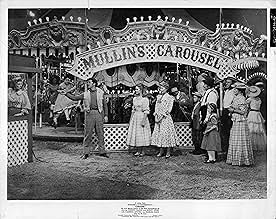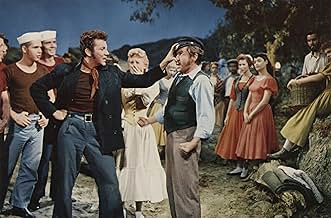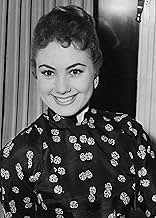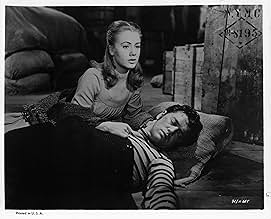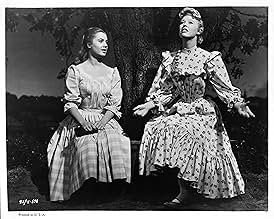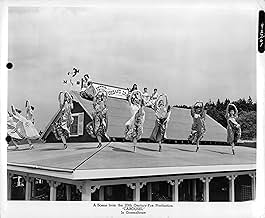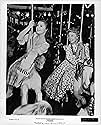IMDb RATING
6.5/10
7.1K
YOUR RATING
Fifteen years after his death, a carousel barker is granted permission to return to Earth for one day to make amends to his widow and their daughter.Fifteen years after his death, a carousel barker is granted permission to return to Earth for one day to make amends to his widow and their daughter.Fifteen years after his death, a carousel barker is granted permission to return to Earth for one day to make amends to his widow and their daughter.
- Awards
- 1 win & 3 nominations total
William LeMassena
- Heavenly Friend
- (as William Le Massena)
Jacques d'Amboise
- Louise's 'Starlight Carnival' Dancing Partner
- (as Jacques D'Amboise)
Walter Bacon
- Graduation Spectator
- (uncredited)
Robert Banas
- Ruffian in Louise's Ballet
- (uncredited)
Tex Brodus
- Townsman
- (uncredited)
Buddy Bryan
- Dancer
- (uncredited)
Bob Calder
- Dancer
- (uncredited)
Harry Carter
- Third Policeman
- (uncredited)
Featured reviews
The dark, brooding Rodgers & Hammerstein stage musical gets the big-budget screen treatment in this 1956 release, and the results are only moderately successful. The actors have great voices -- and certainly the score to "Carousel" is the lushest and densest R&H produced -- but they're simply not good enough actors to explore the depths of the musical's book. Gordon MacRae and Shirley Jones were fine as perky country folk in "Oklahoma!" from a year earlier, but MacRae is not a dangerous enough presence to pull off the rough character of Billy Bigelow.
Still, as mentioned, the score sounds wonderful and remains mostly intact for the film. And Agnes DeMille provides some characteristically stunning screen choreography, especially in the trademark R&H ballet sequence.
Grade: B
Still, as mentioned, the score sounds wonderful and remains mostly intact for the film. And Agnes DeMille provides some characteristically stunning screen choreography, especially in the trademark R&H ballet sequence.
Grade: B
I can't remember how old I was when I first saw this on TV, but it was a long time ago (we had a B&W TV!)...but even though I saw it in B&W, it had an impact that has lasted. This musical has the most gorgeous score by the great Richard Rodgers. Also believe this music got me hooked onto opera later in my youth and that opened an entirely other world of music to me.
But back to Carousel, the story is beautiful and moving, sad and romantic. The stuff of great musicals. And the music is wonderfully scored by the Fox maestro of the time, Alfred Newman and the superb Fox orchestra!! I think that if Fox had made this film earlier (like in the 40's, the orchestrations might have been sparser. In 1956, with bigger production spending (to get audiences away from their TVs and back into theatres), the musicals are also beefed up orchestrally (with improved stereo recording techniques) to make the most of the score. (The soundtrack is also an enjoyable one to experience on its own.)
I loved the scenery of the Maine coast...I have even travelled to Maine and made a special stop in Boothbay Harbor--much changed since 1956 I am sure, but it felt wonderful to visit there. I only wish that the town would make more of an effort to promote the fact that Carousel's location filmwork was done there.
The cinematography is splendid and lush. I love the way the camera is used in the Carousel Waltz sequence, with the music dominating any dialogue. Modern directors wouldn't dare try that today!
I can live with the juxtapositional mixes of location photography vs. the in-studio filming. Not all the dancing could be done on a real beach. And I was very pleased that the entire Soliloquy scene was shot outdoors, very beautiful camera-work following Mr. MacRae's movements. And he sings that song like it was written for him. I agree with most other reviewers here, that Mr. Sinatra was not right for this part.
Shirley Jones is just gorgeous to look at and so believable in this role. Too bad, she only really has two songs, one being the duet with MacRae. Claramae Turner's rendition of the classic You'll Never Walk Alone always brings tears to me, even now after all these years.
Even at the end, I am teary-eyed. That tells me this movie is timeless.
I hope anyone who has never seen it, and reads the reviews here, that you will be able to find as much joy and love from this great music and story that we all have.
But back to Carousel, the story is beautiful and moving, sad and romantic. The stuff of great musicals. And the music is wonderfully scored by the Fox maestro of the time, Alfred Newman and the superb Fox orchestra!! I think that if Fox had made this film earlier (like in the 40's, the orchestrations might have been sparser. In 1956, with bigger production spending (to get audiences away from their TVs and back into theatres), the musicals are also beefed up orchestrally (with improved stereo recording techniques) to make the most of the score. (The soundtrack is also an enjoyable one to experience on its own.)
I loved the scenery of the Maine coast...I have even travelled to Maine and made a special stop in Boothbay Harbor--much changed since 1956 I am sure, but it felt wonderful to visit there. I only wish that the town would make more of an effort to promote the fact that Carousel's location filmwork was done there.
The cinematography is splendid and lush. I love the way the camera is used in the Carousel Waltz sequence, with the music dominating any dialogue. Modern directors wouldn't dare try that today!
I can live with the juxtapositional mixes of location photography vs. the in-studio filming. Not all the dancing could be done on a real beach. And I was very pleased that the entire Soliloquy scene was shot outdoors, very beautiful camera-work following Mr. MacRae's movements. And he sings that song like it was written for him. I agree with most other reviewers here, that Mr. Sinatra was not right for this part.
Shirley Jones is just gorgeous to look at and so believable in this role. Too bad, she only really has two songs, one being the duet with MacRae. Claramae Turner's rendition of the classic You'll Never Walk Alone always brings tears to me, even now after all these years.
Even at the end, I am teary-eyed. That tells me this movie is timeless.
I hope anyone who has never seen it, and reads the reviews here, that you will be able to find as much joy and love from this great music and story that we all have.
I saw Carousel for the very first time in its first release when it played a double bill with Oklahoma. You can't do much better than that for an introduction to the American Musical Theater.
It would get a perfect 10 had it been done with the original two leads that were set for the show, Frank Sinatra and Judy Garland. Judy backed out before production started and Sinatra shortly after that, so Gordon MacRae and Shirley Jones got to do a second Rodgers&Hammerstein classic.
Carousel is based on the Ferenc Molnar play Liliom and the original setting is in Molnar's native Hungary. On Broadway it was done by Eva Le Gallienne and Joseph Schildkraut and later in revival by Ingrid Bergman and Burgess Meredith. One man who did it in summer stock was Tyrone Power who if a straight dramatic version of Liliom had ever been done, would have been perfect.
Whether he's Liliom in Hungary or Billy Bigelow in 19th century New England, the part is one for a hero/heel that Tyrone Power patented on the screen. Probably Gordon MacRae benefited in no small way in having Power's favorite director Henry King in charge of Carousel.
Richard Rodgers was also used to writing for a hero/heel having done Pal Joey with his former partner Lorenz Hart. Billy is that kind of guy, a carousel barker and boy toy to owner Audrey Christie when he spots Julie Jordan and her friend Carrie Pipperidge, a couple of mill workers. It's love at first sight and marriage shortly after, but Billy's not a guy to change his layabout ways and it ends in tragedy.
One reason that Sinatra was also so right for the part was that he had made a successful hit record of Billy's Soliliquy back in 1945 when Carousel debuted on Broadway. It was a groundbreaking piece of musical theater that Dick Rodgers and Oscar Hammerstein were responsible for in the Soliliquy. Billy's just been told by Julie he's about to become a father. In an almost 10 minute number he bares his soul to the audience and sings/thinks aloud the moves he's going to make. The song is almost operatic in quality, it takes a real singing actor to put it over like Sinatra, like MacRae is here, like John Raitt in the original cast on stage.
Though it's not Julie's song, Judy Garland had a successful record with You'll Never Walk Alone. I'm sure she would have sung it in the film had she seen it through. It's probably the big hit song from the score, still an inspiring number today.
Rounding out the cast is Cameron Mitchell as Billy's no good pal Jigger, Robert Rounseville and Barbara Ruick as Mr. Snow and Carrie, the second leads and from the Metropolitan Opera Claramae Turner as Julie's cousin Nettie who does sing You'll Never Walk Alone.
Two more who are perfectly cast are John Dehner as the officious mill owner that employs the girls and the heavenly star-keeper, Gene Lockhart in one of his last roles.
Even more than in Oklahoma, Agnes DeMille's ballet numbers are used to advance the plot. From the exuberant June Is Busting Out All Over to the dance that Billy and Julie's daughter does, all are done with taste and style.
Carousel is both tragic and yet uplifting and inspiring. It's a musical for all the ages to come.
It would get a perfect 10 had it been done with the original two leads that were set for the show, Frank Sinatra and Judy Garland. Judy backed out before production started and Sinatra shortly after that, so Gordon MacRae and Shirley Jones got to do a second Rodgers&Hammerstein classic.
Carousel is based on the Ferenc Molnar play Liliom and the original setting is in Molnar's native Hungary. On Broadway it was done by Eva Le Gallienne and Joseph Schildkraut and later in revival by Ingrid Bergman and Burgess Meredith. One man who did it in summer stock was Tyrone Power who if a straight dramatic version of Liliom had ever been done, would have been perfect.
Whether he's Liliom in Hungary or Billy Bigelow in 19th century New England, the part is one for a hero/heel that Tyrone Power patented on the screen. Probably Gordon MacRae benefited in no small way in having Power's favorite director Henry King in charge of Carousel.
Richard Rodgers was also used to writing for a hero/heel having done Pal Joey with his former partner Lorenz Hart. Billy is that kind of guy, a carousel barker and boy toy to owner Audrey Christie when he spots Julie Jordan and her friend Carrie Pipperidge, a couple of mill workers. It's love at first sight and marriage shortly after, but Billy's not a guy to change his layabout ways and it ends in tragedy.
One reason that Sinatra was also so right for the part was that he had made a successful hit record of Billy's Soliliquy back in 1945 when Carousel debuted on Broadway. It was a groundbreaking piece of musical theater that Dick Rodgers and Oscar Hammerstein were responsible for in the Soliliquy. Billy's just been told by Julie he's about to become a father. In an almost 10 minute number he bares his soul to the audience and sings/thinks aloud the moves he's going to make. The song is almost operatic in quality, it takes a real singing actor to put it over like Sinatra, like MacRae is here, like John Raitt in the original cast on stage.
Though it's not Julie's song, Judy Garland had a successful record with You'll Never Walk Alone. I'm sure she would have sung it in the film had she seen it through. It's probably the big hit song from the score, still an inspiring number today.
Rounding out the cast is Cameron Mitchell as Billy's no good pal Jigger, Robert Rounseville and Barbara Ruick as Mr. Snow and Carrie, the second leads and from the Metropolitan Opera Claramae Turner as Julie's cousin Nettie who does sing You'll Never Walk Alone.
Two more who are perfectly cast are John Dehner as the officious mill owner that employs the girls and the heavenly star-keeper, Gene Lockhart in one of his last roles.
Even more than in Oklahoma, Agnes DeMille's ballet numbers are used to advance the plot. From the exuberant June Is Busting Out All Over to the dance that Billy and Julie's daughter does, all are done with taste and style.
Carousel is both tragic and yet uplifting and inspiring. It's a musical for all the ages to come.
In recent years it has become commonplace to site Frank Kapra's `It's a Wonderful Life' as one of the greatest films ever. It has become a Christmas tradition. I feel that film is overrated. The problem I have with it is that it stacks the deck in trying to convince us of the value of human life. George Bailey is a successful banker- not exactly rich but successful enough that he contributed a lot of material things to people's lives, including a housing development named after him. He also saved his brother's life so his brother could save the men on that ship, etc. etc. The message is that you are of value if you have done the sort of things they build statues of people to honor. On top of that, without George, everybody in this town is nothing. They are all drunks or crooks or prostitutes. They have no capabilities of their own. They are all dependent on George Bailey.
I much prefer Carousel, whose hero is a bum. If you were to ask nearly everybody in town- a town that has done just fine without him, as a matter of fact, what Billy Bigelow contributed to their lives, they would say nothing- if they remembered him at all. The only people who would have anything good to say about him are those that he loved and who loved him. And that is the bottom line. If a person can be redeemed by his ability to love and to inspire love in others, we all have a chance. If you have to have a bank and town named after you, the bar is too high for most of us.
As a musical, this is as good as it gets. `If I loved you' is rivaled only by `Some Enchanted Evening' as a love song and it means more as it's revealing of the character of this crude man who can't express what's in his soul and this shy girl who wants only to love and be loved. `Soliloquy' is the dramatic highlight in the history of the musical as Billy works out all his hopes and dreams in his mind and vows to do anything he can to make his daughter's life special. By over reaching his bounds, he does the opposite. `What's the Use of Wondering' expresses the doubts anyone entering a relationship has and is doubly moving as it's sung by Julie, for whom we know the song will have special relevance. `When You Walk Through a Storm' offers hope to us all. Those old guys at graduations are really worth listening to.
I much prefer Carousel, whose hero is a bum. If you were to ask nearly everybody in town- a town that has done just fine without him, as a matter of fact, what Billy Bigelow contributed to their lives, they would say nothing- if they remembered him at all. The only people who would have anything good to say about him are those that he loved and who loved him. And that is the bottom line. If a person can be redeemed by his ability to love and to inspire love in others, we all have a chance. If you have to have a bank and town named after you, the bar is too high for most of us.
As a musical, this is as good as it gets. `If I loved you' is rivaled only by `Some Enchanted Evening' as a love song and it means more as it's revealing of the character of this crude man who can't express what's in his soul and this shy girl who wants only to love and be loved. `Soliloquy' is the dramatic highlight in the history of the musical as Billy works out all his hopes and dreams in his mind and vows to do anything he can to make his daughter's life special. By over reaching his bounds, he does the opposite. `What's the Use of Wondering' expresses the doubts anyone entering a relationship has and is doubly moving as it's sung by Julie, for whom we know the song will have special relevance. `When You Walk Through a Storm' offers hope to us all. Those old guys at graduations are really worth listening to.
Rodgers & Hammerstein's brilliant stage musical comes to the screen with most of the music intact--and what songs they are. Each one is a gem and fully integrated into the tragic storyline. Gordon MacRae stars as Billy Bigelow, the amusement park barker who tries to change his life when he marries Julie Jordan (Shirley Jones)-- with tragic results. MacRae's robust baritone is showcased in his big number, 'Soliloquy', performed at seaside with the ocean backdrop. Only occasionally is the use of stagebound sets a jarring note--but overall, the look and feel of the movie is one of genuinely moving musical drama.
Delightful performances from Barbara Ruick and Robert Rounseville as Mr. and Mrs. Snow. Their 'When The Children Are Asleep' is a charming highlight. Claramae Turner does an outstanding job on 'You'll Never Walk Alone'. Cameron Mitchell is a slyly villainous Jigger. Filming of the 'June Is Bustin' Out All Over' number in Boothsbay Harbor, Maine is a production highlight and choreographer's dream.
Gordon MacRae and Shirley Jones are in excellent voice for 'If I Loved You'. What more could you want? An exceptional movie musical that ranks with the best of Rodgers & Hammerstein's works.
Delightful performances from Barbara Ruick and Robert Rounseville as Mr. and Mrs. Snow. Their 'When The Children Are Asleep' is a charming highlight. Claramae Turner does an outstanding job on 'You'll Never Walk Alone'. Cameron Mitchell is a slyly villainous Jigger. Filming of the 'June Is Bustin' Out All Over' number in Boothsbay Harbor, Maine is a production highlight and choreographer's dream.
Gordon MacRae and Shirley Jones are in excellent voice for 'If I Loved You'. What more could you want? An exceptional movie musical that ranks with the best of Rodgers & Hammerstein's works.
Did you know
- TriviaThe film was not successful at the box office despite the positive reviews, but the soundtrack album became a national best seller.
- Goofs(at around 59 mins) Billy Bigelow (Gordon MacRae) sings the "My Boy Bill" soliloquy on the beach. One minute and 17 seconds into the song, four jets fly over in formation in the upper left of the frame. This scene was filmed on the beach near Paradise Cove, Malibu, California, in 1955, when there were several operating Navy and Marine military bases in southern California.
- Crazy creditsA star hurtles downward and explodes in mid-air; out of this appears the credit "Twentieth Century-Fox presents Rodgers and Hammerstein's Carousel". The other credits all appear in a straightforward fashion.
- Alternate versionsIn the film's first two telecasts on ABC-TV in 1966, Mrs. Mullin's line "I don't run my business for a lot of sluts." followed by Carrie's retort "Who you calling a slut? Slut yourself!" and Julie says "Yeah, slut yourself!" was edited out. The line was kept on all local station telecasts of the film, and on all video releases.
- ConnectionsFeatured in King of the Movies (1978)
- SoundtracksThe Carousel Waltz
(1945) (uncredited)
Music by Richard Rodgers
Performed by the 20th Century-Fox Studio Orchestra Conducted by Alfred Newman
Details
- Release date
- Country of origin
- Language
- Also known as
- Rodgers and Hammerstein's Carousel
- Filming locations
- Boothbay Harbor, Maine, USA(scenes outside Nettie's Spa and in marina, including musical numbers "June Is Bustin' Out All Over" and "When The Children Are Asleep")
- Production company
- See more company credits at IMDbPro
Box office
- Gross worldwide
- $1,104
- Runtime
- 2h 8m(128 min)
- Color
- Aspect ratio
- 2.55 : 1
Contribute to this page
Suggest an edit or add missing content




